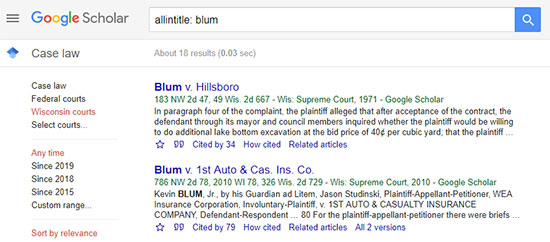
The Compounding Intelligence Layer: Why R&D Teams Must Centralize Knowledge to Accelerate Innovation


As R&D and innovation teams look for ways to quickly access the data they need, many are turning to How to Use Google Scholar for Legal Research. R&D and innovation teams are looking to Google Scholar for its robust search functions and user-friendly design, making it a popular choice among those seeking quick access to data. In this post, we’ll investigate how to utilize Google Scholar for legal research – from refining search strategies to optimizing results. So let’s dive in and learn more about using google scholar for legal research.
Table of Contents
How to Use Google Scholar for Legal Research?
Searching for Legal Information on Google Scholar
Refining Your Search Results on Google Scholar
Tips and Tricks for Using Google Scholar for Legal Research
Exploring Related Articles on Google Scholar
Best Practices for Using Google Scholar for Legal Research
FAQs in Relation to How to Use Google Scholar for Legal Research
How do I use Google Scholar for case law?
How do I use Google Scholar for research?
How can you find articles which reference an article using Google Scholar?
Google Scholar is an online search engine designed specifically for research. Google Scholar offers a wide range of scholarly material, such as journals, books, theses, and conference proceedings. Google Scholar enables users to quickly locate relevant information on their topics of interest and How to Use Google Scholar for Legal Research is not a common, yet important pool of knowledge.
The benefits of using Google Scholar are numerous. For starters, it’s incredibly fast and efficient; users can find what they need in seconds rather than hours or days spent sifting through traditional library resources. Moreover, by drawing from an extensive variety of sources – not just those traditionally indexed in other databases – Google Scholar offers chances to uncover information that would otherwise be out of reach. Finally, its citation tracking feature makes it easy to keep track of references used in one’s work as well as related works cited by others in the field.
Unfortunately, Google Scholar does not have the same quality control mechanisms as a physical library and its automated nature can lead to unreliable results. These include its lack of quality control mechanisms which can lead to unreliable results if care isn’t taken when searching or evaluating sources found therein. Additionally, due to its automated nature it cannot provide personalized assistance like librarians do at physical libraries nor does it have any way of determining whether something has been updated since being published so outdated information may be presented as current fact without warning. As such, it should always be used with caution and supplemented with additional research whenever possible for best results.
Google Scholar is an invaluable tool for legal research, providing access to a wide range of sources and allowing users to refine their searches with ease. It is now time to delve deeper into the utilization of Google Scholar specifically for legal research.
#LegalResearch just got easier. Use #GoogleScholar to quickly find relevant info & keep track of references with its citation tracking feature. Click to Tweet
Google Scholar is an incredibly powerful tool for legal research. Google Scholar provides an expedient way to uncover and access pertinent materials, helping you remain informed of the most current progressions in your domain. With its advanced search features, citation tools, and related articles feature, it’s easy to find what you need. By utilizing its advanced search features, citation tools, and related articles feature, Google Scholar can be leveraged to conduct effective legal research.
To begin a search using Google Scholar, enter keywords that describe the topic or area of law you’re researching into the main search box. To refine your search, you can add extra words or phrases to the keywords you’ve entered. Additionally, if you want more precise results, try using quotation marks around specific phrases when searching; this will help narrow down your results significantly.
Once you have entered a query into the main search box and pressed “enter” or clicked “search” button at the bottom of the page, a list of relevant documents will appear in descending order from most recent publication date first (or relevance). Utilize filters such as author name(s), date range published, and type of document to customize your results for optimal satisfaction.
Lastly, don’t forget to explore related articles which show similar topics that might provide additional insight into whatever topic is being researched. However, these tend not always be directly connected so take them with a grain of salt accordingly.
By leveraging the features of Google Scholar, you can easily and effectively use it for legal research. Let’s explore some ways to maximize the potential of this potent tool.
Key Takeaway Using Google Scholar for legal research can be a powerful tool, with its advanced search features and citation tools. The related articles feature can be utilized to tailor the results to your requirements, allowing you access to the most current data. To make sure you are getting all relevant sources, use quotation marks around specific phrases when searching in order to narrow down your results significantly.
Utilizing its innovative search capabilities, related articles, and citation functions, researchers can access the data necessary for informed decisions in a fast and straightforward manner.

(source)
Utilizing Advanced Search Features on Google Scholar: The advanced search feature on Google Scholar allows users to refine their searches by keyword or phrase, author name, publication year range, language of the document, etc. This helps narrow down results so that only relevant documents are displayed in the results list. Moreover, users can configure notifications to be informed when new documents that match their specifications are added, as well as save searches for future use.
The related articles feature on Google Scholar makes it easy to find additional sources of information related to an article or topic of interest. By clicking “related” at the bottom of any article page, users will be presented with a list of other papers which contain similar keywords or topics as well as those written by authors who have published similar work in the past.
Taking advantage of the citation tools available on Google Scholar is essential when conducting legal research. Utilizing features such as “Cited by”, “Related Citations” and “Similar Articles” provides a way to grasp the frequency of an article being referred to in other works or if there are any relevant topics that could be further explored. Additionally, this helps to ensure that the information being used for decision-making purposes is reliable and up-to-date.
By utilizing the advanced search features, exploring related articles and leveraging citation tools on Google Scholar, legal researchers can gain valuable insights quickly. Next, we will discuss best practices for using Google Scholar to ensure accuracy in research results and tracking searches effectively.
Key Takeaway Google Scholar is an invaluable tool for legal research, offering advanced search features and related articles to help researchers quickly and accurately access the information they need. Additionally, citation tools such as “Cited by” and “Related Citations” provide users with reliable data for making informed decisions. In a nutshell, Google Scholar makes researching in the legal field easier than ever before.
Yet, as with any other resource, to guarantee accuracy and expediency one must adhere to certain rules. When using Google Scholar for legal research, verifying the accuracy of sources and keeping track of searches and results are essential best practices.
Verifying the accuracy of your sources is key when conducting legal research on Google Scholar. It’s important to remember that not all information found on the platform can be trusted as accurate or up-to-date. Therefore, double-checking your sources against multiple reliable resources such as official court documents or published case law is highly recommended before relying on them for a project or report. Additionally, always make sure you’re citing correctly by referencing each source accurately so others can find it easily if needed later down the line.
Keeping track of your searches and results is also important when conducting legal research with Google Scholar. As you search through various topics related to your project or report, take notes along the way so you don’t have to start from scratch every time you need more information about a certain subject matter area or keyword phrase used in your search query. This will help save time during future searches since having quick access to prior queries will enable you to narrow down relevant articles quickly without having to sift through irrelevant ones again from scratch each time around.
Overall, following these two best practices – verifying source accuracy and tracking searches/results – while using Google Scholar for legal research can go a long way towards ensuring successful outcomes for projects involving this powerful platform.
By following the best practices outlined in this article, legal researchers can use Google Scholar to find reliable and accurate sources quickly. Moving forward, we will discuss how these strategies come together in a conclusion that summarizes our key points.
Key Takeaway Verifying the accuracy of sources and tracking searchesresults are two essential best practices when using Google Scholar for legal research. To ensure successful outcomes, it’s imperative to double check information against multiple reliable resources while taking notes on queries to quickly narrow down relevant articles in future searches.
In summary, R&D Managers and Engineers, Product Dev Engineers and Managers, Scientists – Lead or Senior, Commercialization engineers/teams, Senior Directors & VPs of Research & Innovation as well as Heads of Research & Innovation can make the most out of Google Scholar for legal research by taking advantage of its advanced search features to quickly hone in on relevant results. Exploring related articles helps broaden one’s scope beyond the initial query while leveraging citation tools reveals how many other researchers have referred to a particular article or paper within their own work. All in all these techniques enable R&D teams to efficiently utilize Cypris’s platform for rapid time-to-insights when conducting legal research with Google Scholar – thus leaving no stone unturned.
R&D teams can utilize #Cypris to quickly and efficiently conduct legal research with Google Scholar – utilizing advanced search features & citation tools for rapid time-to-insights. #LegalResearch Click to Tweet
Google Scholar is an online database of scholarly articles and legal documents. Google Scholar offers the ability to locate applicable case law for a given subject by entering pertinent words, phrases, or citations. The results will provide links to the full text of cases from various jurisdictions that are most relevant to your search terms. Additionally, you can use Google Scholar’s advanced search options such as narrowing down by date range or jurisdiction in order to refine your results even further.
Google Scholar is an invaluable research tool for professionals of all levels. It provides access to a vast range of scholarly literature, including journal articles, books, and conference papers. By using the search engine’s advanced features such as filters and sorting options, users can quickly narrow down their results to relevant material that meets their specific needs. Google Scholar additionally offers the capability for users to monitor citations connected to particular topics or authors, thus enabling them to stay current with the newest advancements in their area of study.
Google Scholar allows users to search for articles that reference a specific article. To search for articles that reference a specific article, simply type the title of the original article in quotation marks into Google Scholar’s search bar and select “Cited by” from its drop-down menu. This will return a list of all articles that have cited or referenced your chosen article. Additionally, you can refine your results using additional filters such as language, date range, and more.
Google Scholar provides an extensive database that makes it easy to find pertinent case laws and regulations related to any given subject. When using Google Scholar for legal research, best practices include refining searches with advanced filters such as court or date range; utilizing the “Cited by” feature; and saving useful results in a citation manager. By following these tips and tricks when conducting How to Use Google Scholar for Legal Research with Google Scholar, users will find that their efforts are rewarded with more accurate findings which save time in the long run.
Discover how Cypris can help you quickly access the legal research insights you need with our comprehensive Google Scholar integration. Leverage our platform to unlock your team’s full potential and take advantage of all that Google Scholar has to offer!